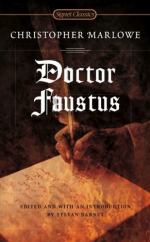|
This section contains 6,441 words (approx. 22 pages at 300 words per page) |

|
SOURCE: "Marlowe and God: The Tragic Theology of Dr. Faustus," in PMLA, Vol. 83, No. 5, October, 1968, pp. 1378-85.
In the following essay, Ornstein suggests that Doctor Faustus is informed by Marlowe's personal vision of a harsh and unforgiving diety, and that the play is "Marlowe's testament of despair."
Apart from Shakespearean drama, few Elizabethan plays have been so frequently and thoroughly studied in recent decades as Marlowe's Dr. Faustus. Yet it remains as problematical a work of art today as it was thirty years ago. Interpretations based on the biographical evidence of Marlowe's atheism are now in disrepute, because scholarly investigations of Elizabethan thought and dramatic traditions would convince us of the orthodoxy of Marlowe's artistic theme and moral attitude. But if earlier "biographical" studies of Dr. Faustus were partial and unsatisfactory, they were at least in touch with the poetic splendor of its lines and the metaphysical terror...
|
This section contains 6,441 words (approx. 22 pages at 300 words per page) |

|


